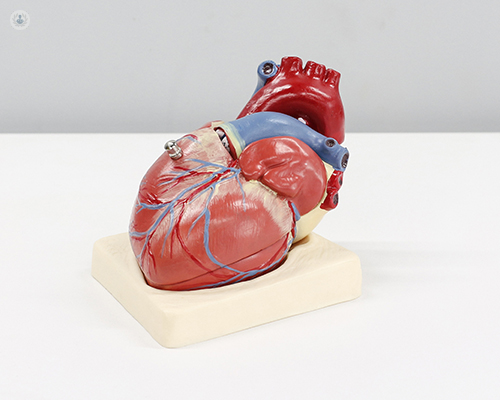A comprehensive explanation of angina
Written by:Angina is a very common condition characterised by pain and discomfort in the chest. In his latest article, highly-esteemed cardiologist and general medicine specialist Dr Khalid Khan offers his expert insight into the condition.

What is angina? What are the causes?
Angina is a symptom that patients commonly present with.
Angina is chest discomfort, sometimes described as pain or heaviness or tightness. It is caused by a narrowing of the arteries supplying the heart with blood. This restricts blood flow and causes heart pain. The pain is commonly experienced on exertion or when lifting heavy things, but can sometimes also arise at rest.
What does the angina pain feel like? Are there any other symptoms?
Angina pain is often experienced as a heaviness, tightness or pressure in the chest. It typically comes on with exertion or emotion, and sometimes also more so in cold weather. Another symptom that can present with angina is breathlessness, again, on exertion.

How is it diagnosed?
Angina is diagnosed based initially on the history that the patient gives you. So that story they give you might suggest that the problem and the symptoms they are experiencing are related to a narrowing or obstruction of the blood supply to the heart.
We would normally follow this up with additional investigations to confirm a narrowing of the heart arteries or a blood flow restriction. This may include an angiogram. These days, this is carried out non-invasively in the first instance in most patients. We use something called a CT coronary angiogram to show the coronary arteries and demonstrate any blockages or narrowing that might be causing the pain.
You may also undertake other tests called functional tests to look for a restriction of blood flow. For example, you might do a stress echocardiogram, a stress nuclear test, or a stress MRI, to show the different forms of stress in the heart and or see if the heart is struggling in terms of blood flow.
Is it a serious condition?
Angina is a condition that does scare a lot of patients, and they may have friends or family members who've suffered a heart attack. However, something all patients must understand is that angina is different from a heart attack. Angina is a symptom and it can be treated very well in the modern era.
It's not a condition that should scare people as it's very amenable to treatment and with good treatment, patients tend to do very well.
When is treatment required? What does treatment entail?
There are two main goals for angina treatment. One is to reduce complications that might arise in the future, which might include reducing the risk of a heart attack or a stroke.
The other major goal of treatment is to reduce the symptoms and improve the patient’s quality of life. To reduce future risks of adverse events one would give medication such as aspirin, or a statin, and also look at any other risk factors that might be contributing to angina. This could include diabetes or cholesterol.

Then we would also give a treatment to improve the symptoms. There's a whole range of different drugs that one could use to help symptoms. In addition, for patients where medication is insufficient, the doctor may consider additional treatments which we call revascularization, which means improving blood flow.
This can be done using balloons and stents. In some patients whose disease is quite extensive and not responding to treatment, we might consider doing a bigger procedure, a bypass type operation.
Dr Khalid Khan is a leading cardiologist and general medicine specialist based in Wrexham and Cheshire. If you are worried about your angina, or any other heart condition, please don’t hesitate to book a consultation with Dr Khan today via his Top Doctors profile


